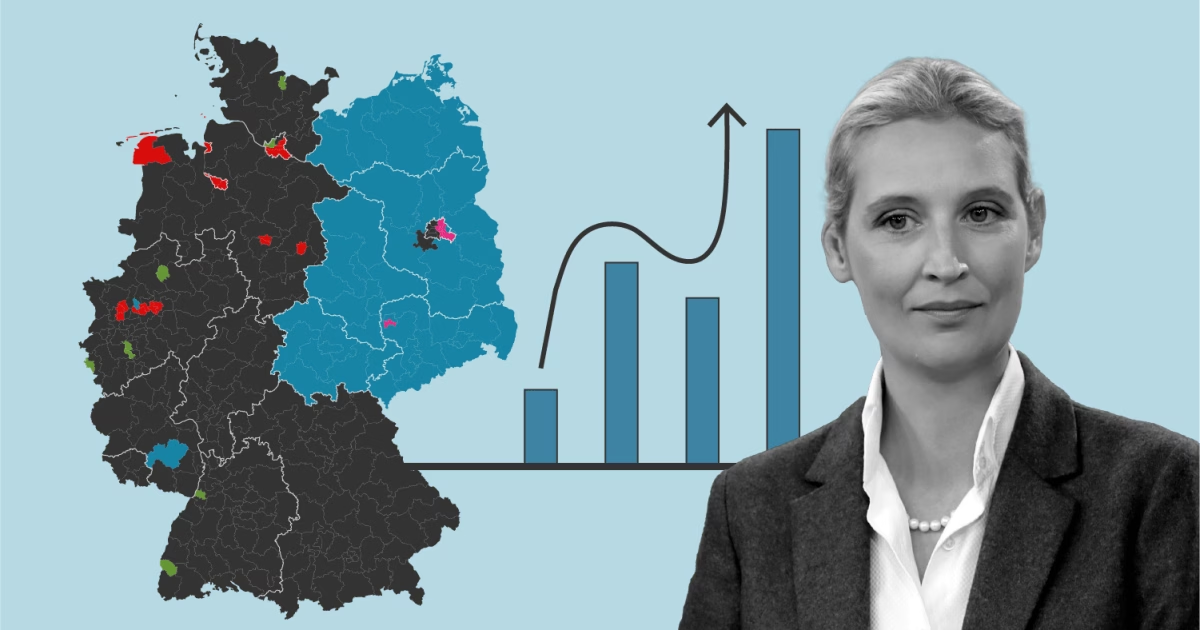The Alternative for Germany (AfD) increases its share of the vote from 10.4 percent in 2021 to 20.8 percent, becoming the second most prominent political party in Germany.
The Christian Democratic Union (CDU), alongside its sister party the Christian Social Union, secured the highest number of votes on Sunday with 28.6 percent, and has ruled out forming a coalition with the AfD, which poses a challenge to forming a stable government.
The AfD champions several key policies resonating with many German voters, including:
- Strict immigration controls, involving the refusal of asylum applications and initiatives to deport foreign nationals
- Economic reforms, such as abandoning the euro for a return to the German mark
- Changes in foreign policy, such as ensuring Germany’s exit from the NATO alliance
- Reversal of energy transition, including removing existing wind turbines and re-embracing nuclear energy
Who is AfD leader Alice Weidel?
Alice Weidel, who has a background in finance and an economics doctorate, has risen to leadership within the AfD since joining in 2013. Starting as a eurosceptic party, the AfD shifted towards nationalism and strict immigration policies under Weidel’s guidance.
Weidel’s ascension was fueled by capitalizing on voter dissatisfaction, particularly in former East Germany, by opposing immigration, green energy policies, and globalization. Her influence has grown through social media and notable interviews, such as with tech billionaire Elon Musk, attracting attention to her policies of “remigration” and nationalism.

How has the AfD performed in the past?
The party’s electoral success mirrors growing voter discontent about migration, the economy, and mainstream parties’ handling.
Initially formed to oppose the euro, the AfD won 4.7 percent of votes in its debut at the 2013 federal elections, falling short of the 5 percent threshold needed for Bundestag representation.
In the 2017 federal elections, the party garnered 12.6 percent of votes and entered the Bundestag with 94 seats, becoming the third largest party. Its popularity was largely due to then-Chancellor Angela Merkel’s policy of welcoming refugees in 2015.
Although the AfD retained strong support in eastern Germany, its overall vote share dropped to 10.3 percent in the 2021 elections, placing it as the fifth largest party. The focus then shifted away from migration towards the COVID-19 pandemic response.
In the most recent elections, the AfD’s vote share exceeded its previous decision, focusing this time on immigration and economic issues.
Where did the AfD perform best?
In the latest elections, the AfD secured votes in nearly every German constituency, performing well in eastern Germany due to economic and employment disparities persisting after reunification.
Historically, the Left party also thrived in eastern Germany, though it has experienced diminishing support recently. The Left party maintains connections with older voters, who recall its roots as the ruling party of East Germany.

Will the AfD be part of Germany’s coalition?
Mainstream parties have ruled out any coalition with the AfD due to its nationalist stance and far-right leanings, which limits coalition options for Germany.
A grand coalition that includes the CDU, the CSU, and the Social Democratic Party (SPD) is now most likely, with CDU leader Friedrich Merz as a potential chancellor.








